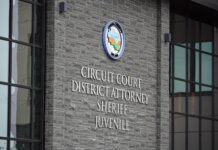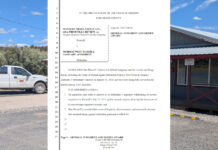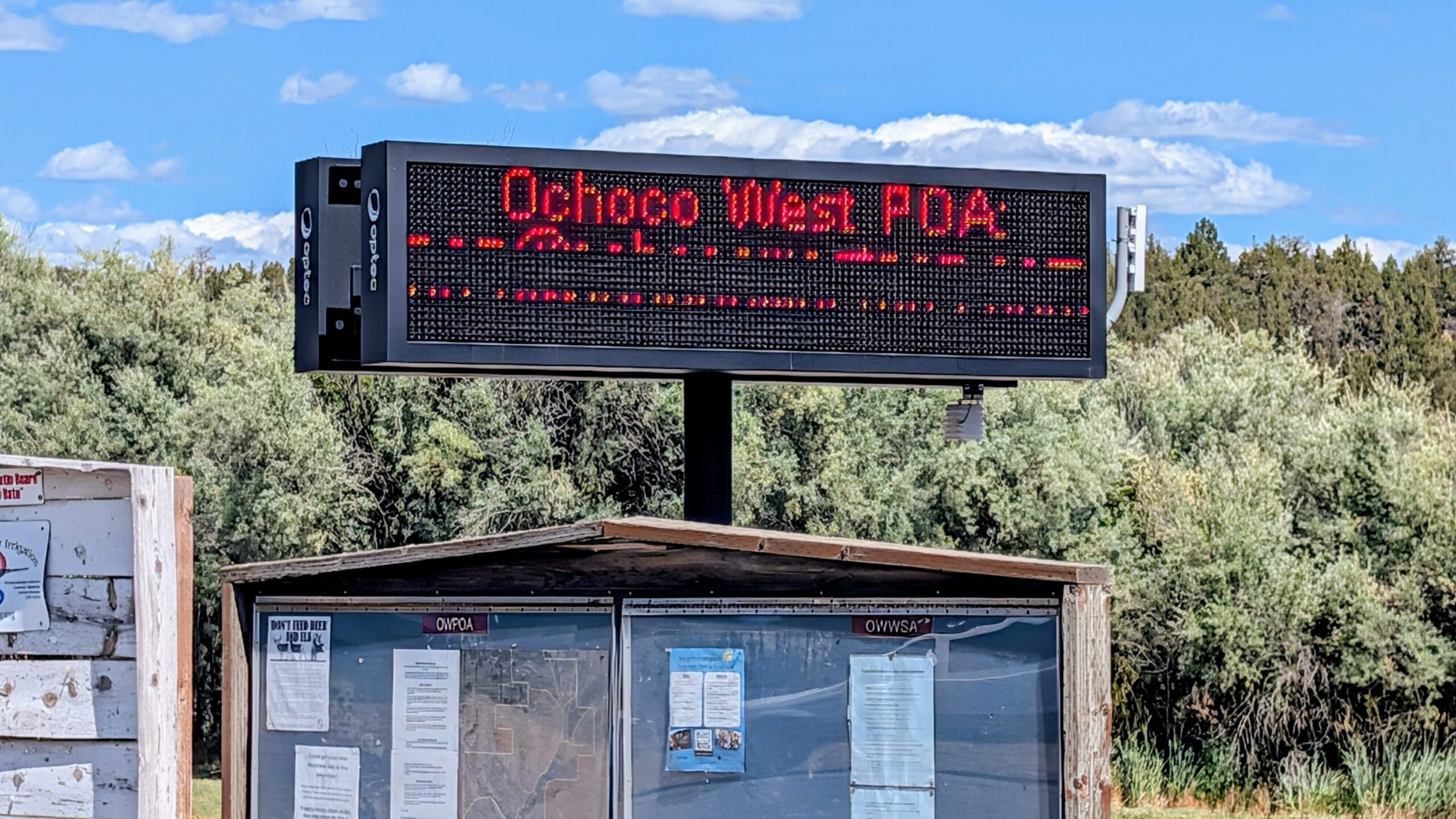
Crook County, Ore. – The board of the Ochoco West Water & Sanitary Authority (OWWSA) held an illegal special meeting Tuesday night, July 29th, after issuing just four hours’ notice to the public and media—far short of the 24-hour bare minimum required by Oregon law. Despite being warned in advance that the meeting would violate state transparency laws, four of the seven board members proceeded anyway. The meeting was not an emergency, and no justification was offered.
Just prior to the meeting, longtime OWWSA legal counsel Jered Reid also formally resigned as its attorney. Reid also represents the City of Prineville and numerous other public bodies in Central Oregon. Meeting minutes and prior records show that Reid had been advising the board in recent months on a series of legal and insurance-related concerns—including warnings that OWWSA may be operating outside the scope of its authority under Oregon law.
The decision to hold the meeting could now subject the four attending board members to legal challenges and an investigation by the Oregon Government Ethics Commission (OGEC). In cases of an OGEC investigation, officials cannot use a public body’s legal counsel if they desire to have legal representation, according to a past 2023 Staff Advisory Opinion from the OGEC.
Reid had also already been in the middle of communications with the Prineville Review as part of helping with a response to our July 21st public meetings grievances within recent days. Reid was also included in our email communication expressing concern with the board’s last-minute notice, which was sent shortly before he reportedly emailed the OWWSA Board shortly after 4 pm Tuesday to inform them he was withdrawing as legal counsel, according to the email, which was shared by one of the board members.
The Prineville Review has confirmed that a key topic on the July 29th agenda was granting Board Chair Dan Parks the authority to seek new legal counsel to respond to what the board vaguely referred to as a “complaint” from the Prineville Review, which the board’s agenda referred to as a “request”. This was likely a reference to the July 21st public meetings grievance.
(Editor’s Note: A public meetings grievance is distinctly different from a formal complaint filed with the Oregon Government Ethics Commission, which can only be submitted after an initial grievance process is exhausted.)
The OWWSA has been part of a growing list of public bodies in Crook County either struggling to comply or even intentionally working to cause frustration under the public records and/or meetings laws in the face of increased government accountability reporting, namely from the Prineville Review, which has repeatedly had to raise challenges.
Earlier this year, Crook County received a scathing review from the Oregon Public Records Advocate, who said its practice and position “does not align with the law”.
Meeting violations continue despite escalating scrutiny
Tuesday’s meeting is just the latest in a series of troubling transparency violations by the OWWSA board. In recent months, the special district has held meetings and executive sessions without providing required notices, and likely did not comply with all requirements related to executive session disclosures. The failure to provide notice to the Prineville Review also came despite having resumed notice late last year in response to earlier grievances filed when the OWWSA initially refused to provide notice upon this publication’s request, a clear requirement under ORS 192.640 and in guidance provided by the Oregon Department of Justice.
The board has also failed to provide consistent remote access options or meet other basic requirements under Oregon’s Public Meetings Law. The OWWSA previously claimed in response to a previous public meeting grievance that it was not “reasonable” for it to provide remote access to the public and was thus not required under ORS 192.670, but then, in recent months, it provided remote access to multiple board members on multiple occasions. According to its own meeting minutes, during its July 1st meeting, it permitted two board members to attend remotely while not allowing the same means for members of the news media or the public, as there was no publication of any phone or web conference information in its notice.
Shortly before the meeting was called to order, at least one board member reportedly raised the possibility of rescheduling due to the lack of proper notice and the legal concerns raised by the press. However, Board Chair Dan Parks chose to proceed, calling the meeting to order around 6 p.m.
In addition to the referenced “complaint”, the agenda included two other items—“POA Desk” and “SDAO Training”—that lacked any meaningful description. The Oregon Department of Justice’s Public Records and Meetings Manual states that agenda items must list “the principal subjects expected to be considered,” with enough specificity to allow the public to understand what matters will be discussed.
Discussion during the meeting revealed that “POA Desk” referred to an arrangement for the Ochoco West Property Owners Association to place a desk inside the OWWSA building for apparent administrative use—a topic further raising ethical concerns about the blending of public and private interests between the two entities. The “SDAO Training” item did not clarify whether the board would receive training, discuss requesting it, or take action related to it, leaving the public in the dark as to its scope. It was not until the meeting that it became clear the agenda item was related to announcing upcoming training courses by the SDAO, although the specifics of the training were not disclosed.
The OWPOA is a separate and private entity from the OWWSA, which is a public entity subject to typical rules under Oregon law related to public transparency, including public records and meetings. A more limited set of laws applies to property owners’ associations, including with meetings and records, but those laws only provide rights to actual homeowners within the association.
Property ownership, tax questions, & exceeding legal authority
These issues come as OWWSA faces heightened scrutiny over a number of irregularities uncovered through the Prineville Review’s ongoing investigations and its own disclosures in meeting minutes.
Among them: OWWSA has acknowledged improperly holding land and real property that it was not legally allowed to, extending beyond its scope of authority as a water and sanitary district. That action has likely enabled the private Ochoco West Property Owners Association (OWPOA) to avoid decades of tax liability, while OWPOA members continued to use and benefit from amenities owned by the public special district, which enjoys numerous tax exemptions.
OWWSA board members (both past and present)—almost all of whom would also be members of the POA—have not disclosed any conflicts of interest regarding the ongoing arrangements, according to minutes provided since early 2024.
Another flaring issue in recent months involves long-standing disputes about access to lands owned by the OWWSA, and how either the OWWSA or the Crook County government has allowed the OWPOA to restrict use of the public lands and a reservoir to only OWPOA members.
At least one property owner, who would only speak on condition of anonymity, stated that numerous properties in the subdivision are sold with the claims that access to the reservoir and a gun range on the lands are “private” amenities. They expressed that many property owners would “feel cheated” having bought property with the potential that these claims were inaccurate, perhaps for decades.
The Prineville Review is currently looking further into the numerous claims and questions regarding the authority of the OWPOA and OWWSA.
The OWPOA maintains signage at a gated entrance along Grizzly Road that declares Joe Fisher Reservoir to be a “private lake,” warning that non-members may be subject to criminal trespass. Despite multiple requests from the Prineville Review seeking access, the OWPOA has not responded. According to several sources familiar with the situation, access disputes surrounding the reservoir have persisted for years. At one point, Crook County reportedly closed public access, but the OWPOA was still able to permit unrestricted access for its own members.
The issue has drawn further scrutiny due to the surrounding property being publicly owned—split between the OWWSA, a public special district, and the U.S. Bureau of Land Management (BLM). Legal questions have also arisen under Oregon’s Public Use of Waterways doctrine, which can provide public rights to access and use certain waterways even when the bed and banks are privately owned. In the case of Joe Fisher Reservoir, however, it does not appear that either the land or the reservoir includes ownership by the private OWPOA.
The Prineville Review contacted the OWPOA last week, requesting access to Joe Fisher Reservoir and asking questions about its authority and restrictions. It has ignored our requests for comment.
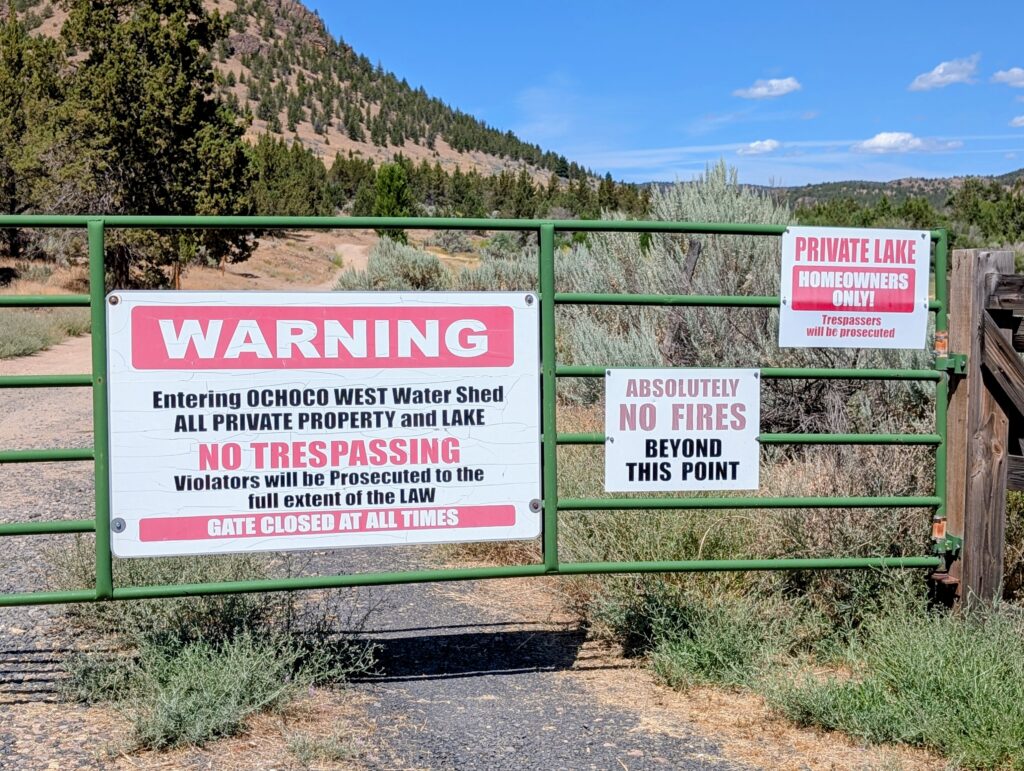
Additionally, recent OWWSA meeting minutes revealed that Reid, its now former attorney, had been working with the board to address mounting concerns raised by both himself last year, as well as more recently by the district’s insurance underwriter, Special Districts Insurance Services (SDIS). One of the underwriter’s major concerns centered on the district’s ownership of property that “is not part of their chartered mandate”, property which appears to be primarily for the benefit of the OWPOA and its private members, rather than for any authorized public purpose.
The arrangement raises significant legal and insurance liability issues, as public district assets are generally not supposed to subsidize or serve the interests of a private property owners association. The ongoing relationship could expose existing and previous board members of the OWWSA to potential ethics violations due to benefiting from the amenities provided by the private POA that they are members of.
The Prineville Review could not locate a single record where any board member declared any actual, let alone any potential conflict of interest as required by Oregon’s ethics & public office laws.
The discovery also appears to show a potential pattern in Crook County involving water districts and their neighboring or overlapping private property owners associations. Earlier this year, the Highland Subdivision Water District was found to be engaging in questionable transactions and ethics violations, as well as repeated and ongoing public meeting violations. The Prineville Review’s investigation into the HSWD started last year after allegations from multiple homeowners of intimidation and unequal treatment by the HSWD Board and the HSPOA.
In June, an official with its insurance company, Bancorp Insurance Company, told the OWWSA Board about issues with its current property ownership. “He states that the only thing [sic] that OWWSA should have and do are things directly related to water and sanitary,” read the minutes from a June 10th meeting.
These concerns were part of broader warnings that OWWSA may be engaging in activities not authorized under Oregon law for a water and sanitary authority.
That same meeting, a community member, who was not identified in the minutes, reportedly asked questions about back taxes, one of the lingering questions involving some of the OWPOA’s property being put under OWWSA ownership in the past decades, which likely resulted in the POA avoiding tax obligations while continuing to use the property and amenities. “It was asked by a community member about the back taxes,” the minutes stated.
OWWSA contracted with an illegal horse boarding business purporting to be “co-op”
That legal overreach included OWWSA’s quiet involvement with a purported “co-op” horse boarding business operating on district land for the benefit of POA members and the business owner. OWWSA has refused to provide public comment on the matter, but previously acknowledged the arrangement in meetings last year.
The business, which reportedly operates under the name “Ochoco West Horse Coop”, is not registered as required by Oregon law.
The Prineville Review has since confirmed with the Oregon Secretary of State’s Corporation Division that the business was not legally registered—despite claims by board members and staff that it was a “cooperative.”
When pressed for further details, the board declined to identify the individual behind the operation. However, recent meeting minutes have revealed the owner to be Riki Johnson, who also spoke at a meeting that was not properly reported to the news media. Johnson was also confirmed to reside and own property within the Ochoco West subdivision under the POA.
In response to inquiries from the Prineville Review, the Oregon Secretary of State confirmed:
“There are no business filings associated with the name ‘Rikki Johnson,’” said Laura Kerns, a communications specialist for the Oregon Secretary of State’s Audit Division. “Cooperative registrations are relatively uncommon. We currently have about 300 active co-ops out of more than 500,000 total registrations.”
Additional checks were also made under the variations, including Johnson’s actual first name spelling of “Riki”. Johnson also owns a home located within the Ochoco West subdivision under the OWPOA.
Kerns also explained that co-ops traditionally are made up of housing and utilities that additionally fall under the purview of cities and counties.
“Registering a cooperative does require a few extra things beyond the standard filing. We also require information about capital stock, membership stock, purpose, distribution of assets, and the number of directors on the board. We are responsible only for the registration process; we don’t provide operational or legal guidance for co-ops,”
False co-op claims are a known tactic used by some horse boarding operations to avoid labor laws, payroll taxes, and workers’ compensation insurance. These arrangements often rely on customers providing labor—such as feeding or caring for horses beyond their own—in exchange for reduced boarding rates or benefits. Labeling the business as a “co-op” can create a misleading appearance of shared ownership, when in reality, customers are performing unpaid or underpaid work without legal protections, and without being actual equity members of a registered cooperative.
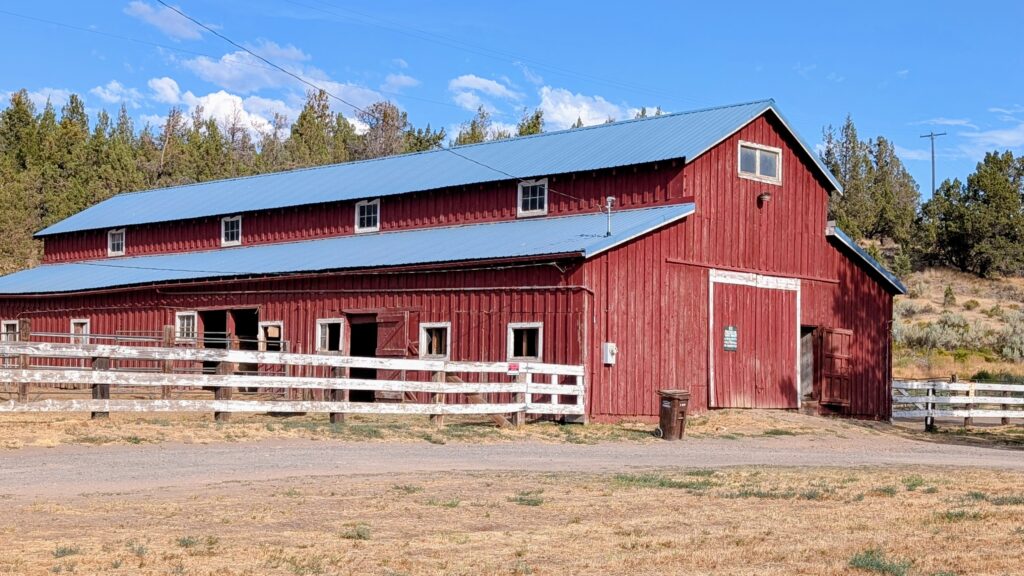
We have been unable to reach Johnson to seek comment for publication and were unsure if the phone numbers listed for her were current.
The Prineville Review also has a pending records request that the OWWSA is now delaying after it failed to acknowledge before the legally required deadline this last Monday. When we asked board members on Tuesday why its staff had not even acknowledged the request, Parks claimed they were reaching out to the attorney about it.
However, the vote taken by the board on Tuesday only appeared to be about addressing the recent public meetings grievance, but there was no mention of engaging an attorney to address the public records request. Public records requests, especially the simple acknowledgement, are generally not handled by attorneys for public bodies.
The request sought copies of recent agreements between the OWWSA and the “Ochoco West Horse Coop”, as well as communications between OWWSA and OWPOA officials. The failure by the OWWSA may require the Prineville Review to seek review from the Crook County District Attorney or facilitated dispute resolution through the Oregon Public Records Advocate.
Following initial publication, the Prineville Review submitted another public meetings grievance, this time for the illegal July 29th meeting.
Note: This story was updated after publication to add additional links to source documents.
This is a developing story that we will keep you updated on. If you have information to share relevant to this story, you can also contact us by clicking here.
Mr. Alderman is an investigative journalist specializing in government transparency, non-profit accountability, consumer protection, and is a subject matter expert on Oregon’s public records and meetings laws. As a former U.S. Army Military Police Officer, he brings a disciplined investigative approach to his reporting that has frequently exposed ethics violations, financial mismanagement, and transparency failures by public officials and agencies.


